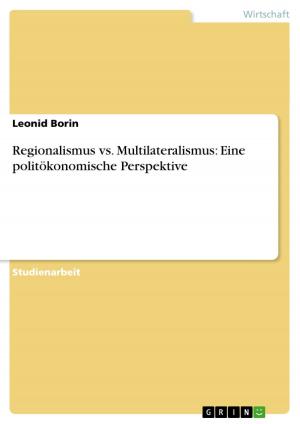Standardization in International Marketing strategy: doomed to failure or successful strategy?
Business & Finance, Marketing & Sales| Author: | Christina Liessem | ISBN: | 9783656852391 |
| Publisher: | GRIN Verlag | Publication: | December 2, 2014 |
| Imprint: | GRIN Verlag | Language: | English |
| Author: | Christina Liessem |
| ISBN: | 9783656852391 |
| Publisher: | GRIN Verlag |
| Publication: | December 2, 2014 |
| Imprint: | GRIN Verlag |
| Language: | English |
Essay from the year 2011 in the subject Business economics - Marketing, Corporate Communication, CRM, Market Research, Social Media, grade: 80, Queen Mary University of London (Business School), course: International Marketing, language: English, abstract: The debate around standardization versus adaptation in international marketing consists since nearly half a decade now. The first articles regarding the question whether firms should adapt their strategy and marketing program to the local costumers needs or if they rather should focus on global standardization were published in the 1960's (e.g. Bartels, 1968; Buzell, 1968; Elinder, 1961/1965; Keegan, 1969). Since then over 300 articles address this research question and it is a never- ending debate with inconsistent findings. A recent detailed meta-study over relevant articles of the last 50 years leads to contradictory findings: Out of 274 articles published in Marketing and Management Journals, 8% recommended global standardization, 14 % favored adaption, 10 % could not give a recommendation and the majority (68%) stated that companies have to make their decision grounded on the specific situation they are in (Schmid & Kotulla, 2010). These contradictory findings in the literature alone show, that the statement 'Standardization in International Marketing strategy is doomed to failure' cannot be easily agreed with. This essay has the purpose to disprove the statement and demonstrate, with the help of previous literature and practical examples, that in certain contexts and for some companies, standardization can be a successful strategy. Chapter 2 provides an overview of the debate standardization versus adaptation and the empirical results of a choice of articles. Chapter 3 explains which aspects of the marketing mix will be observed and clarifies the definition of standardization. Following in Chapter 4 two companies within the consumer goods will be presented, who clearly follow an international standardization marketing approach. A conclusion will be provided in Chapter 5, integrating a final valuation of the discussed statement.
Essay from the year 2011 in the subject Business economics - Marketing, Corporate Communication, CRM, Market Research, Social Media, grade: 80, Queen Mary University of London (Business School), course: International Marketing, language: English, abstract: The debate around standardization versus adaptation in international marketing consists since nearly half a decade now. The first articles regarding the question whether firms should adapt their strategy and marketing program to the local costumers needs or if they rather should focus on global standardization were published in the 1960's (e.g. Bartels, 1968; Buzell, 1968; Elinder, 1961/1965; Keegan, 1969). Since then over 300 articles address this research question and it is a never- ending debate with inconsistent findings. A recent detailed meta-study over relevant articles of the last 50 years leads to contradictory findings: Out of 274 articles published in Marketing and Management Journals, 8% recommended global standardization, 14 % favored adaption, 10 % could not give a recommendation and the majority (68%) stated that companies have to make their decision grounded on the specific situation they are in (Schmid & Kotulla, 2010). These contradictory findings in the literature alone show, that the statement 'Standardization in International Marketing strategy is doomed to failure' cannot be easily agreed with. This essay has the purpose to disprove the statement and demonstrate, with the help of previous literature and practical examples, that in certain contexts and for some companies, standardization can be a successful strategy. Chapter 2 provides an overview of the debate standardization versus adaptation and the empirical results of a choice of articles. Chapter 3 explains which aspects of the marketing mix will be observed and clarifies the definition of standardization. Following in Chapter 4 two companies within the consumer goods will be presented, who clearly follow an international standardization marketing approach. A conclusion will be provided in Chapter 5, integrating a final valuation of the discussed statement.















